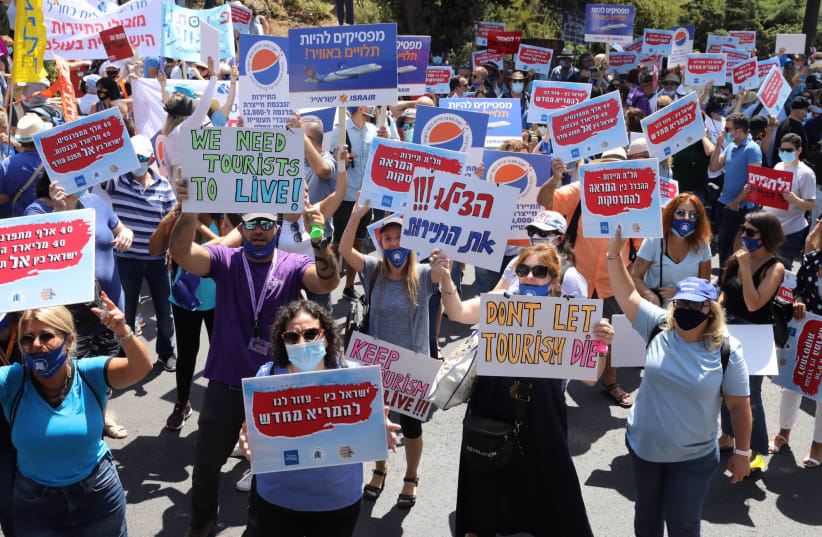"Open the skies!" shouted protesters, while waving model airplanes. The protesters demanded support from the government for the time they were unable to operate and for flights with other countries to be reopened.
After Greece and Cyprus announced plans to allow Israeli tourists to visit the country earlier this month, many companies rushed to return to selling tickets, rooms and packages to eager customers.
However, the European Union announced on Saturday that Israel is considered a "red country" due to its high infection rates, meaning Israelis will not be allowed to enter the EU. The compounded losses from this sudden turn of events and the cancellation of Passover trips cost tour groups hundreds of thousands of euros, along with the costs of marketing the now cancelled trips, according to Ynet.
Tourism Minister Asaf Zamir informed the protesters that a round table would be formed with representatives of the tourism industry in order to prepare a plan to reopen flights, according to Channel 12.
The Information and Research Center of the National Security Council warned on Tuesday that if the current infection rate continues and the epidemic isn't constrained, then Israel will not open its skies on August 1, according to KAN news.
About 9% of those who have applied for unemployment benefits work in the hospitality industry, according to The Jerusalem Post's sister paper Maariv. This marks a 6,000% increase, 1.5 times the increase in the number of unemployed from the commercial industry.
Only 2,300 foreign visitors arrived in Israel during the entire month of May, according to official data published on Thursday, reflecting the impact of strict government restrictions on international travel amid the coronavirus pandemic.
Other than cases deemed exceptional by the Foreign Ministry, all foreign nationals have been denied entry to Israel since March 18, even if they can prove their ability to remain in home isolation for 14 days upon arrival.
The figures represent a dramatic drop compared to previous years, with about 466,000 visitors arriving in May 2019 – including 440,000 tourists.
Last year, Israeli hoteliers enjoyed a third consecutive record-breaking year of tourism in 2019, welcoming approximately 4.55 million tourists to the country. Incoming tourism injected approximately NIS 23 billion ($6.67b.) into the economy, the Tourism Ministry said.
Organized incoming tourism contributes a total of NIS 8 billion ($2.32b.) annually to the Israeli economy, or 40% of all tourism-related income, according to the Israel Incoming Tour Operators Association. In 2018, over 1.25 million tourists arrived in Israel as part of 30,000 groups - primarily Christian tours.
Last week, ministers voted to allocate financial aid worth over NIS 50 million ($14.5m.) to support the tourism-dependent city of Tiberias. The assistance package will assist a variety of stakeholders to encourage tourism in the city, located on the shores of the Sea of Galilee, which has been among the hardest hit locations during the coronavirus outbreak due to its dependence on international, Christian tourism.
According to the National Insurance Institute, the number of people who have applied for unemployment benefits who have not returned to work was 673,567. Since the beginning of the crisis, 1,074,905 Israelis have requested unemployment benefits, and more than 92% were accepted, the NII said.
Maayan Jaffe-Hoffman and Eytan Halon contributed to this report.
